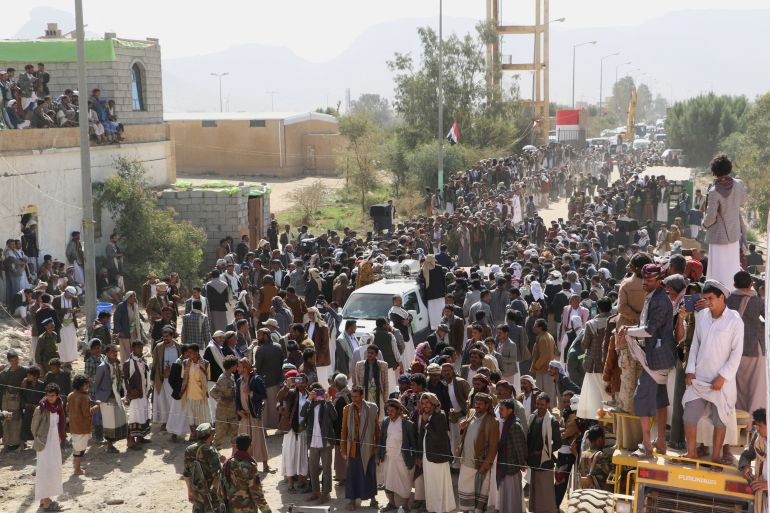Internet returns to Yemen after air raid caused four-day outage
Attack by Saudi-led coalition that targeted a Hodeidah telecoms facility killed three children and was blamed for knocking out internet nationwide.

Internet services have returned to Yemen after a four-day outage caused by deadly Saudi-led coalition air raids that marked a dramatic escalation in the seven-year war.
An attack by the Saudi-led coalition that targeted a telecoms facility in Hodeidah late on Thursday killed three children and was blamed for knocking out the internet nationwide.
Keep reading
list of 3 itemsUN calls for probe into Saudi-led coalition air raids in Yemen
‘A war crime against humanity’: Yemen rebels denounce attack
The air raid coincided with an attack on a prison in rebel-held Saada which left at least 70 people dead and wounded more than 100.
The Saudi-led coalition denied bombing the prison.
The internet outage affected emergency operations after the attacks as rescuers scrabbled through the rubble for survivors and the hospitals in Saada were overwhelmed.
On Tuesday, web monitor NetBlocks said internet was “being restored” in the country and several social media users and correspondents in the capital Sanaa and port city Hodeidah reported they were back online shortly after midnight.
“Connectivity collapsed after a series of deadly airstrikes. The incident severely limited independent media and human rights monitoring efforts,” NetBlocks said.
The attacks followed a deadly drone-and-missile assault by Yemen’s Iran-backed rebels on the UAE capital Abu Dhabi, which drew threats of reprisals as well as international condemnation.
Two more rebel missiles were intercepted over Abu Dhabi on Monday.
The UAE is part of the coalition fighting on the side of Yemen’s internationally recognised government.
The internet is back in #Yemen and life is back to us.
— Baraa Shiban براء شيبان (@BShtwtr) January 25, 2022
Back to the dark ages
During the four-day blackout, Yemenis struggled to fulfil daily needs.
Many livelihoods that depend on working online or communicating with companies and clients outside the country were forced to a halt.
In Sanaa, Majid Abdullah said he was unable to receive money from relatives in Saudi Arabia at an exchange office as a result of the ongoing outage.
“I don’t know what to do. We eat and drink from the [money sent by] expatriates,” he said.
Thousands of Yemeni expats, who rely on video calls to communicate with their families, were deprived of the precious contact.
Muammar Abdullah, a Yemeni living in Saudi Arabia, said he was not able to continue his daily online checks on his family in Sanaa – more important now as coalition air raids increase – as a result of the blackout and instead had to make costly international calls.
Meanwhile, Sanaa-based university student Maha Muhammad said she turned to the television after being cut off from her internet chats with friends and family.
“We went back to watching television to follow the news. I used to rely on websites and social networking sites for the latest war developments,” she said.
Wide outrage
The internet blackout caused outrage among Yemen observers and social media users, who complained that not enough attention was being paid to an entire nation left in darkness.
Shireen Al-Adeimi, an assistant professor at Michigan State University, expressed her dismay at the muted reaction the appalling events in Yemen received from news providers.
I'm still trying to process that 24 hours ago, Saudi Arabia, the United States, and the United Arab Emirates disabled an entire country's internet service while committing various massacres around #Yemen and this isn't top news everywhere.
— Shireen Al-Adeimi (@shireen818) January 21, 2022
Yemeni researcher Afrah Nasser called on social media users to tweet about the developments in Yemen and raise awareness about the blackout.
PLEASE. PLEASE. PLEASE. Get #Yemen trending! It's a hell on earth right now. Innocent civilians are bombarded in cold blood, while the internet is down. I don't know what to say else. At least 300 people were killed or wounded over the past 24 hours. I am running out of words…
— Afrah Nasser (@Afrahnasser) January 21, 2022